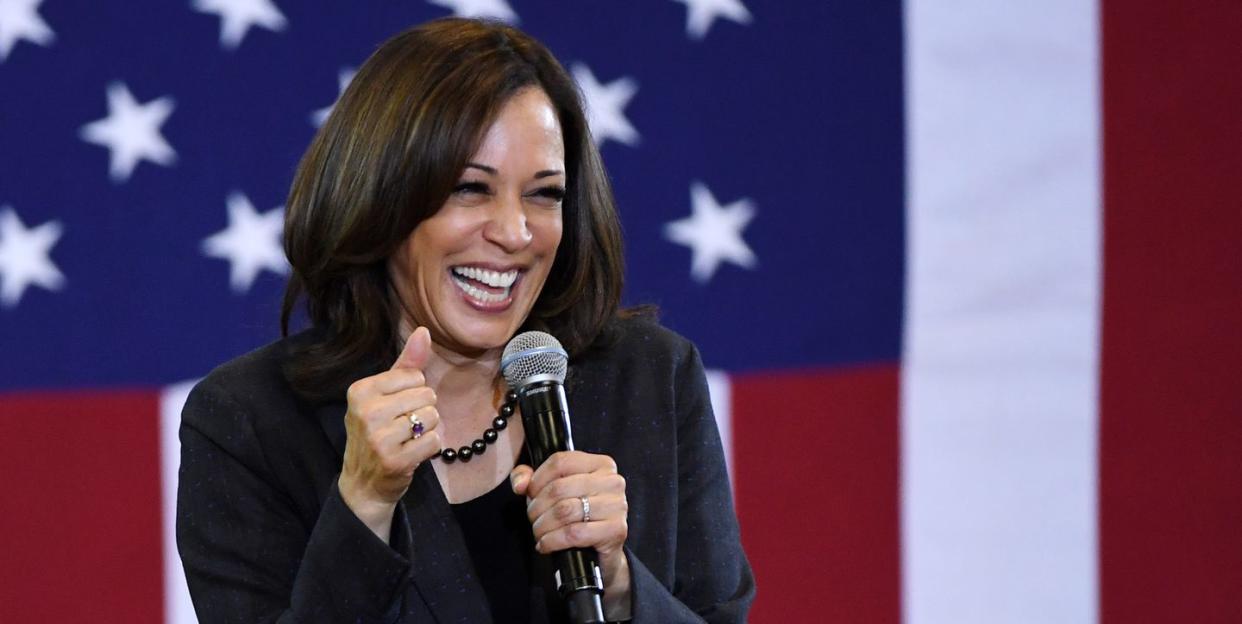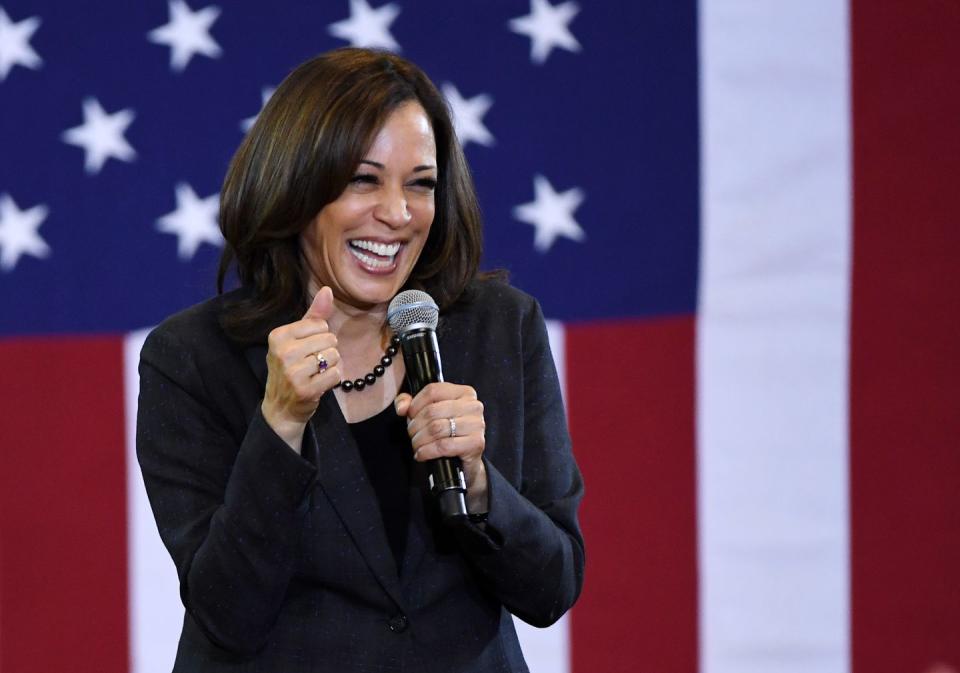The Highs and Lows of Kamala Harris's Evolving Position on Marijuana

Democratic Senator Kamala Harris is one of many hopefuls in the already-crowded pool of 2020 presidential candidates. If she secures the Democratic nomination, she’ll be the first African-American woman to be a major party’s nominee.
Harris cares deeply about maternal health, supports DREAMers and the Deferred Action for Childhood Arrivals program, and favors of a ban on assault weapons and on the sale of high-capacity magazines.
She's also voiced her support for the Green New Deal. But her stance on a different "green" issue—marijuana—hasn't always been so clear. During her tenure as California’s Attorney General, and later in the U.S. Senate, she's changed her mind more than a few times.
On Tuesday, she announced a progressive new bill, one she’s rolling out with House Judiciary Chair Rep. Jerry Nadler, to decriminalize the possession of marijuana on a federal level. The plan, called the Marijuana Opportunity Reinvestment and Expungement Act, would aim, "to correct the historical injustices of failed drug policies that have disproportionately impacted communities of color and low-income communities by requiring expungement of prior convictions and re-sentencing," according to her office.
Below, a complete guide to her evolving position on weed.

Early on, Harris approved of medical marijuana, but nothing beyond that.
In 2010, the year she was elected California attorney general, Harris opposed an initiative to legalize marijuana, which would have "allowed local governments to regulate and tax recreational marijuana two years before Colorado and Washington passed their measures," according to The Los Angeles Times,
"Spending two decades in court rooms, Harris believes that drug selling harms communities,” her campaign manager, Brian Brokaw, told Capitol Weekly. “Harris supports the legal use of medicinal marijuana but does not support anything beyond that.”
Four years later, when the debate on the legalization of marijuana was a big issue in the 2014 race for California's attorney general, her opponent Ron Gold said in an interview that "it needs to be legalized" recreationally.
Harris was told Gold's position on the issue by a local news station and asked for her thoughts. She paused for four seconds, nodded her head five times, before laughing and responding with, "He's entitled to his opinion."
In 2015, Harris called for the decriminalization of marijuana.
At the May 2015 California Democrats Convention a year later, Harris called for an end to "the federal ban on medical marijuana," but stopped short of talking about total legalization.
After she was elected to represent California in the U.S. Congress in 2016, Harris addressed the audience at a conference sponsored by liberal think tank Center for American Progress, making the biggest pro-marijuana statement in her political career thus far.
“Let me tell you what California needs, Jeff Sessions. We need support in dealing with transnational criminal organizations and dealing with human trafficking, not in going after grandma’s medicinal marijuana,” she said.
“While I don’t believe in legalizing all drugs, as a career prosecutor I just don’t, we need to do the smart thing, the right thing, and finally decriminalize marijuana,” she added.
The fact is, marijuana laws are not applied and enforced in the same way for all people. That’s why I've signed onto @CoryBooker’s Marijuana Justice Act to make marijuana legal at the federal level. It’s the smart thing to do. pic.twitter.com/JD5qqm0bfU
— Kamala Harris (@KamalaHarris) May 10, 2018
In 2018, she signed an act to make marijuana federally legal.
In 2018, Harris added her name to Sen. Cory Booker's Marijuana Justice Act "to make marijuana legal at the federal level," she explained on Twitter.
“Right now in this country people are being arrested, being prosecuted, and end up spending time in jail or prison all because of their use of a drug that otherwise should be considered legal,” she said in a press release. “Making marijuana legal at the federal level is the smart thing to do, it’s the right thing to do. I know this as a former prosecutor and I know it as a senator.”
Harris also signed a joint-letter alongside Sen. Orrin Hatch last year demanding Sessions stop blocking research efforts on medical marijuana.
“The benefits of research are unquestionable,” they wrote in the letter. “Ninety-two percent of veterans support federal research on marijuana, and the Department of Veterans’ Affairs is aware that many veterans have been using marijuana to manage the pain of their wartime wounds. America’s heroes deserve scientifically-based assessments of the substance many of them are already self-administering.”
Senators Hatch and @SenKamalaHarris wrote a letter to Attorney General Jeff Sessions this morning, calling on the Department of Justice to stop blocking medical marijuana research. https://t.co/94TGbP4af4 #utpol pic.twitter.com/Cjl0gLad4g
— Senator Hatch Office (@senorrinhatch) April 12, 2018
In the lead up to the election, Harris has made it clear she believes all marijuana should be legal.
In her new book The Truths We Hold, Harris argues that all marijuana use should be legalized and that "nonviolent marijuana-related offenses" should be removed from people's records.
"We need to legalize marijuana and regulate it," she writes. "And we need to expunge nonviolent marijuana-related offenses from the records of the millions of people who have been arrested and incarcerated so they can get on with their lives."
Three weeks after announcing her candidacy for president, Harris appeared on the "The Breakfast Club," a New York-based radio show, where co-host Charlamagne Tha God asked if she had ever smoked. "I have. And I inhaled, I did inhale. It was a long time ago, but yes," the California Democrat replied.
Realizing the admission might "break news," Harris explained that she smoked a joint in college while listening to Snoop Dogg and Tupac Shakur. However, as someone pointed out on Twitter, Harris graduated Howard University in 1986 and UC Hastings College of the Law in 1989—years before Snoop or Tupac released their debut studio albums.
Kamala Harris claims to have smoked pot in college while listening to Tupac and Snoop.
Tupac's first album came out in 1991.
Snoop's first album came out in 1993.
Kamala Harris graduated college in 1986.
🤔🤔🤔 pic.twitter.com/8BU0h27I12— whitey on the moon (@joshieecs) February 11, 2019
Harris went on to tell Charlamagne Tha God that she supports the legalization of weed. "Look I joke about it, half joking—half my family's from Jamaica—are you kidding me," she said."I have had concerns, the full record, I have had concerns, which I think, first of all, let me just make this statement very clear, I believe we need to legalize marijuana... Now, that being said, and this is not a 'but,' it is an 'and,' and we need to research, which is one of the reasons we need to legalize it. We need to move it on the schedule so that we can research the impact of weed on a developing brain. You know, that part of the brain that develops judgment, actually begins its growth at age 18 through age 24."
"But I am absolutely in favor of legalizing marijuana," she added. "We've got to do it. We have incarcerated so many, and particularly young men and young men of color, in a way that we have not for the same level of use [among] other young men."
In a interview with Jamaica Global Online, her father Donald Harris called the remarks a “travesty” and accused his daughter of stereotyping.
“My dear departed grandmother s(whose extraordinary legacy I described in a recent essay on this website), as well as my deceased parents , must be turning in their grave right now to see their family’s name, reputation and proud Jamaican identity being connected, in any way, jokingly or not with the fraudulent stereotype of a pot-smoking joy seeker and in the pursuit of identity politics," he said. "Speaking for myself and my immediate Jamaican family, we wish to categorically dissociate ourselves from this travesty.”
In July 2019, she introduced the Marijuana Opportunity Reinvestment and Expungement Act.
In a press release provided to ELLE.com, Harris says that, "“Times have changed, marijuana should not be a crime.”
Her new bill revealed on July 23, the Marijuana Opportunity Reinvestment and Expungement Act, would essentially expunge marijuana-based convictions and use tax revenue to help create trust funds for people affected by the War on Drugs. It also supports small business owners of legitimate cannabis-related companies and lays out non-discrimination protections for marijuana use or possession, and for prior convictions for marijuana offenses.
“We need to start regulating marijuana, and expunge marijuana convictions from the records of millions of Americans so they can get on with their lives," Harris says about the plan. "As marijuana becomes legal across the country, we must make sure everyone — especially communities of color that have been disproportionately impacted by the War on Drugs — has a real opportunity to participate in this growing industry."
The sweeping legislation was introduced alongside House Judiciary Chairman Rep. Jerry Nadler, who said, “Despite the legalization of marijuana in states across the country, those with criminal convictions for marijuana still face second class citizenship. Their vote, access to education, employment, and housing are all negatively impacted. Racially motivated enforcement of marijuana laws has disproportionally impacted communities of color. It’s past time to right this wrong nationwide and work to view marijuana use as an issue of personal choice and public health, not criminal behavior. I’m proud to sponsor the Marijuana Opportunity Reinvestment and Expungement Act to decriminalize marijuana at the federal level, remove the needless burden of marijuana convictions on so many Americans, and invest in communities that have been disproportionately harmed by the war on drugs.”
('You Might Also Like',)

